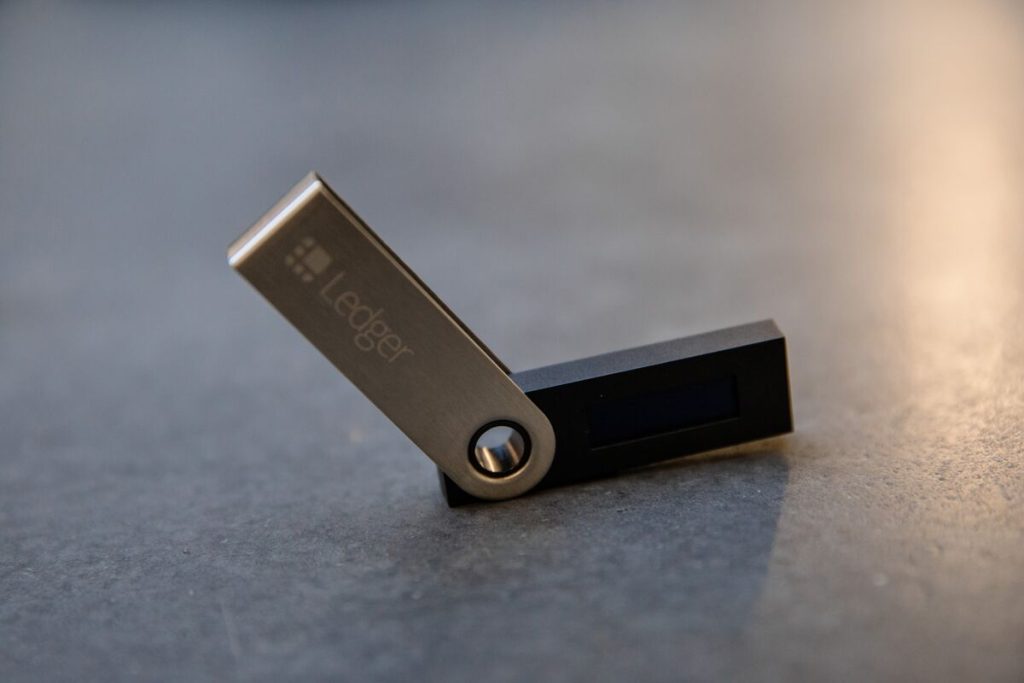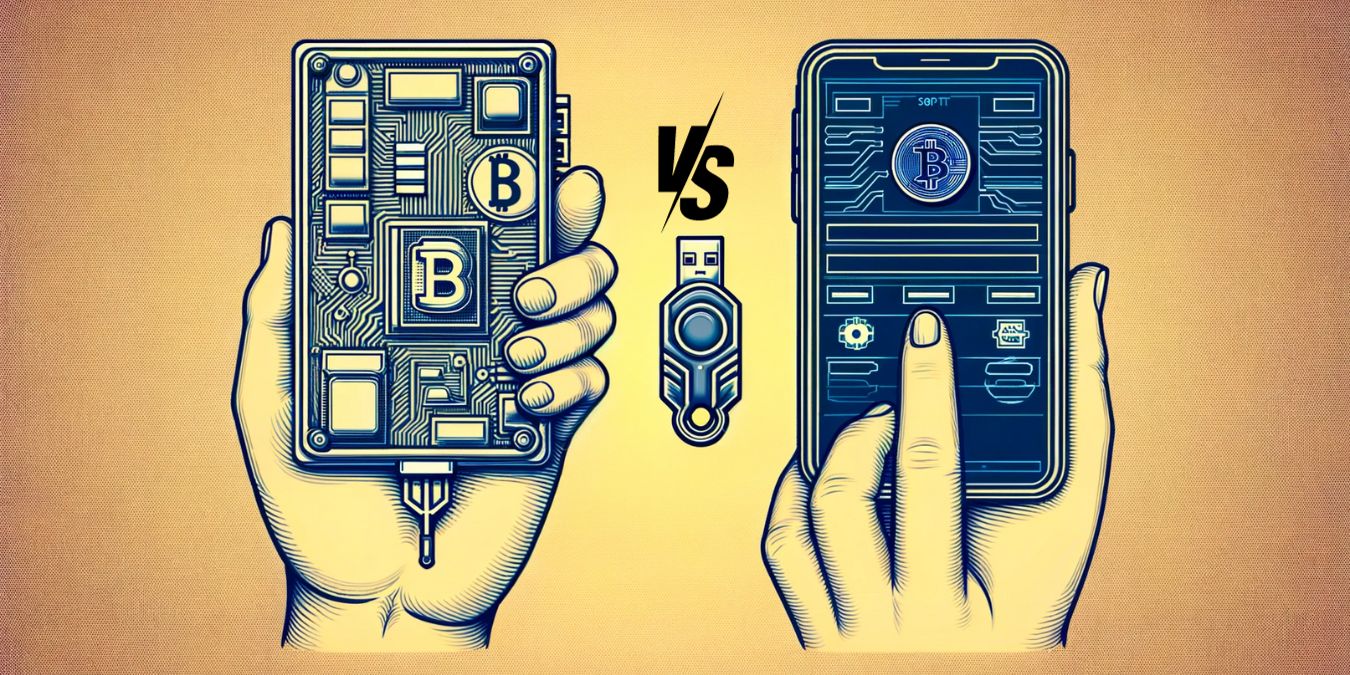When it comes to cryptocurrency, many people neglect the need for a wallet and don’t understand the significance one plays in safeguarding your digital assets. A crypto wallet acts as an interface and enables the holder to access digital currency stored inside it.
The choice of wallet is narrowed down to two primary options, these are hardware wallets and software wallets. The security of one’s digital assets is dependent on the choice of wallet. Each wallet has its own set of benefits and security features. Comparing the factors of the two will help one choose the right crypto wallet.
What is a Crypto Wallet?
Firstly, before we can make a comparison between a hardware wallet and a software wallet, we need to take a step back and understand the basics of a crypto wallet. Owning cryptocurrency is considerably different from owning fiat currency.
Cryptocurrency is a collection of codes that is stored on a blockchain with a unique address. The digital assets you store on a blockchain have two keys, one being a public key and the other a private key.
The public key serves as your wallet’s address, which allows people to send payments to you. A private key is like a password that allows you to access your digital assets. A crypto wallet stores the public and private keys of your digital assets, allowing you to keep ownership of your digital assets. Now comes the hard part, deciding which crypto wallet works best for you.
Hardware Wallets vs Software Wallets
Hardware Wallet

Hardware wallets are physical devices specifically designed for storing a user’s cryptographic keys in offline or ‘cold storage’. A hardware wallet doesn’t store any of the user’s digital assets. Instead, it stores all of the user’s private keys and allows them to later access their coins on the blockchain.
Despite being a cold storage device, all the data stored on a hardware wallet can be easily backed up with a PIN code or recovery phrase. Hardware wallets come with several robust backup and recovery options, thus making it possible to regain access to digital assets even if the device suffers damage.
Most hardware wallets can be integrated with software wallets and convert hot storage into cold storage. Hardware wallets can even work with multiple blockchains simultaneously and allow a user to manage various digital assets from one device.
Hardware wallets are considered to be one of the safest wallets to use when trading digital assets, as they allow users to directly trade from the wallet itself, rather than depositing cryptocurrency into an exchange wallet. However, hardware wallets are considerably expensive to purchase.
Software Wallet

A software crypto wallet or ‘hot wallet’ is a digital application installed on your computer or mobile device that interacts with a blockchain. Thus allowing you to send, receive, and manage your digital assets.
These wallets always remain connected to the internet in more than one way, ensuring greater accessibility than a hardware wallet. There are various software wallets, the difference between them is how they store and manage cryptographic keys.
Software wallets can also be categorized into custodial and non-custodial wallets. A custodial software wallet is where a third party manages a digital asset for the owner, like a centralized crypto exchange.
A third party, which issues the software wallet, retains the account’s private keys for itself. The owner of the digital asset gains access to the wallet by entering a username and password into the entity’s interface.
On the other hand, a non-custodial software wallet gives the owner complete control of the digital asset. The risk associated with using a non-custodial wallet is that if a user happens to misplace or forget their keys and passwords, they will lose their digital assets.
Key Differences Between Hardware and Software Wallets
To find out which crypto wallet best suits your needs, let’s take a closer look at the key differences between hardware and software wallets. Here are the key differences:
Accessibility
Hardware or ‘cold storage’ wallets are actual devices like USB thumbs, that have to be lobbied around. These crypto wallets have to be connected to an internet-enabled device to use them.
Unlike hardware wallets, software wallets are an application installed on a device. As software wallets are available on the device, it allows a person to easily execute a transaction.
In simple terms, software wallets are more accessible than their counterparts. If a person regularly does transactions with their digital assets, the convenience of logging into an application makes a world of difference.
Cost
Cost is one of the key factors people that into consideration when determining which crypto wallet to use. Hardware wallets are significantly expensive to purchase, as they are physical devices.
On the other hand, software wallets are generally free to download and may charge a fee for certain features. Depending on a user’s needs, software wallets are the preferred option when it comes to factoring into costs.
Password Recovery
Hardware and software wallets both have password recovery options, though each process is slightly different. When users first start working with a hardware wallet it will automatically generate a 12,18, or 24-word seed phrase during setup.
The seed phrase is a string of 12, 18, or 24 words that store all the information needed to recover digital assets on a blockchain. The string of words needs to be put in the same order for users to recover a wallet.
The seed phrase plays an important role in hardware wallets as it can be used to recreate a password and two-factor authentication process. If the seed phrase is lost, a user will not be able to access their funds.
Similarly, to recover funds and recreate passwords on a software wallet, users will also have to make use of a backup key. When using a software wallet with a centralized exchange, users will be able to change passwords through a recovery link in their email address.
Security
Security and the safety of one’s private keys are at the top of the priority list when it comes to transacting with cryptocurrency. Hardware wallets are undoubtedly the more secure, as they operate offline and are outside the reach of potential hackers.
Hardware wallets are only susceptible to attack once connected to an internet-enabled device. However, if a user regularly updates the device’s security software and security layers, the vulnerability a device faces is diminished.
Software wallets, in comparison, are connected to an online source and are vulnerable to cyberattacks. The security of a software wallet resides with the security standards of the device the application is installed on.
Suppose a person uses the services of a custodial wallet and leaves their digital assets on a centralized exchange. In that case, the security of their digital assets relies on the steps taken by the exchange.
Storage
Both hardware and software wallets work as an interface between the user and a blockchain. No actual digital assets are stored on either wallet, which means they offer the same in terms of storage.
Support for digital assets
The support of hardware wallets for digital assets is rather limited in comparison to software wallets. The compatibility range of hardware wallets attached to large crypto ecosystems is much smaller compared to those of software wallets.
Binance’s official software wallet, Trust Wallet, supports over 10 million variants of digital assets. In comparison, Trezor, a renowned hardware wallet, is limited to just over 1,200 digital assets.
User interface
The user interface of software and hardware wallets is inherently different. A software wallet’s interface is more aesthetic and is designed to enhance the layout for the accessibility of a user. Whereas the user interface of a hardware wallet leans heavily towards security and may be lacking in an appealing design.
Drawbacks of Hardware and Software Wallets
Despite the numerous benefits hardware and software wallets offer users, there are several risks associated with each other. Here are some risks and drawbacks one can expect when using them.
Drawbacks of Hardware Wallet
Loss or Destruction
One of the most common drawbacks to using a hardware wallet is the possibility of losing the device. Physical damage and or destruction of the device will result in stored data being lost or damaged, it’s therefore important to have a backup of your private keys.
Phishing and Scams
A hardware wallet is useless against social engineering. If a user of the wallet voluntarily exposes their seed phase to a “fraudulent wallet support specialist”, the funds can be taken regardless of the protection levels implemented.
Malware
A virus-infected desktop or device is one of the biggest causes of stolen cryptocurrency. While a hardware wallet may prevent a hacker from accessing a person’s funds, hackers can still redirect a user’s payments. The moment a user makes a transaction with their hardware wallet, malware can substitute the wallet’s intended address for one of its own.
Fake Wallets
Purchasing a crypto wallet poses a risk in itself. Criminals have been known to target crypto wallets and modify them with firmware. To avoid the possibility of purchasing modified or fake hardware wallets, never buy a crypto wallet from a classified ad or second-hand.
Drawbacks of Software Wallet
Online Keys Are Not Secure
One of the most prominent risks associated with using a software wallet is that it stores your cryptographic keys in your browser’s data store. Since your browser is always connected to an internet source, your private keys are susceptible to cyberattacks.
Transactions Are Not Tamper Proof
When making a transaction with a software wallet, the details of the transaction appear on your screen to cryptographically sign it. Devices such as desktops and smartphones are susceptible to cyberattacks, and they can interfere with the display of your device and change the details. Thus you could be signing malicious transactions without even knowing it.
Vulnerabilities in the App
One of the potential drawbacks associated with using a custodial software wallet is that hackers can gain access to your digital assets through vulnerabilities in the app. Web-based wallets may also be vulnerable to attack if proper security measures are neglected.
Examples of Hardware and Software Wallets
There are a variety of hardware and software wallets available on the market. Let’s take a look at some of the most trusted and safe wallets in 2024.
The Best Software Wallets In 2024
MetaMask`
MetaMask is by far the most popular decentralized software wallet application available for Chrome browsers and mobile devices. The application is designed with a user-friendly interface and supports numerous ERC-20 tokens.
Trust Wallet
Trust Wallet is a user-friendly noncustodial wallet that allows users to purchase cryptocurrency with over 100 fiat currencies. The software wallet features a staking mechanism that enables users to stake their cryptocurrency and earn interest. Despite this, the lack of direct customer support is notable.
Monero Wallet
Monero Wallet steps into the spotlight for those who prioritize privacy when it comes to Cryptocurrencies. It’s the perfect companion for Monero, a cryptocurrency that prides itself on untraceable and confidential transactions. The Monero Wallet is all about giving you control over your privacy. Transactions are not just secure; they’re practically invisible on the blockchain, offering a level of anonymity that’s hard to beat. This wallet is tailored for users who value discretion above all else in their crypto dealings. Hence, it’s popular for Darknet Market users to use this wallet. It has a user-friendly interface, it’s incredibly straightforward to use, ensuring your focus stays on what matters. The Monero Wallet isn’t just a storage option; it’s a statement of your commitment to privacy in the digital age.
Read more about Monero Wallet here
Zengo Wallet
Although relatively new, Zengo Wallet has made some waves over the last few months due to it’s “unhackable” strength. To put their security to the test, Zengo has even offered anyone 10 BTC if they can hack a certain wallet. So far, it’s stood the test of time. With its biometric security layers, you’re always in control yet free from the hassle of traditional security methods. Zengo is more than a wallet; it’s your seamless gateway to the world of cryptocurrency.
Common Hardware Wallets
Ledger
Ledger is renowned for its hardware wallets. The company also offers a decorated mobile app and a dedicated desktop app. Ledger’s Nano X is equipped with smart card encryption, paperless remote login, backup data, PIN entry, and remote password protection.
Read about Ledger Here
Trezor
Trezor is one of the safest cold storage wallets for digital assets with a desktop offering. The hardware wallet doesn’t offer a mobile app, although it does include one for smartwatches. Trezor offers limited support for iOS devices. However, its wallet includes impressive seed phrase functionality.
SafePal
SafePal has proven itself as a solid cold storage hardware wallet. Unlike its competition, SafePal gives users access to protect & manage Bitcoin, Ethereum, and thousands of other digital assets. it has its own hot wallet option for greater integration, though cold storage is its prize child. The wallet uses both cable connection and Bluetooth for seamless connection, and ease of use.
The Verdict
The choice between a hardware or software wallet is dependent on the user’s personal needs. Hardware wallets are naturally more secure than software wallets, as they store cryptographic keys offline, however, they come with a heavy price tag. In comparison, software wallets are more convenient, and cost-effective, and offer greater accessibility.
If a person wants to hold a digital asset for the long term, a hardware wallet is the obvious choice. Traders and users who wish to use their digital assets daily should consider using a software wallet for the ease of convenience.
The key difference lies in their method of storage. Hardware wallets are physical devices that store your private keys offline, making them less vulnerable to online hacking. Software wallets are software and web-based wallets that store your keys, making them more convenient but potentially more susceptible to online threats. Each has its purpose.
Hardware wallets offer enhanced security because they store your private keys offline, on a physical device, isolated from the internet. This makes scams, attacks, and malware virtually impossible.
Although Software wallets are encrypted, they are still connected to the internet and can be more vulnerable to cyber threats and unauthorized access.
Software wallets offer more convenience and faster access for daily transactions and trading.

Hey there, I’m a dark web geek who’s been around for the last 8 years. More precisely, I’m livedarknet’s senior content writer who’s been writing about darknet marketplaces, tutorials, and cybersecurity stuff for educational purposes.

